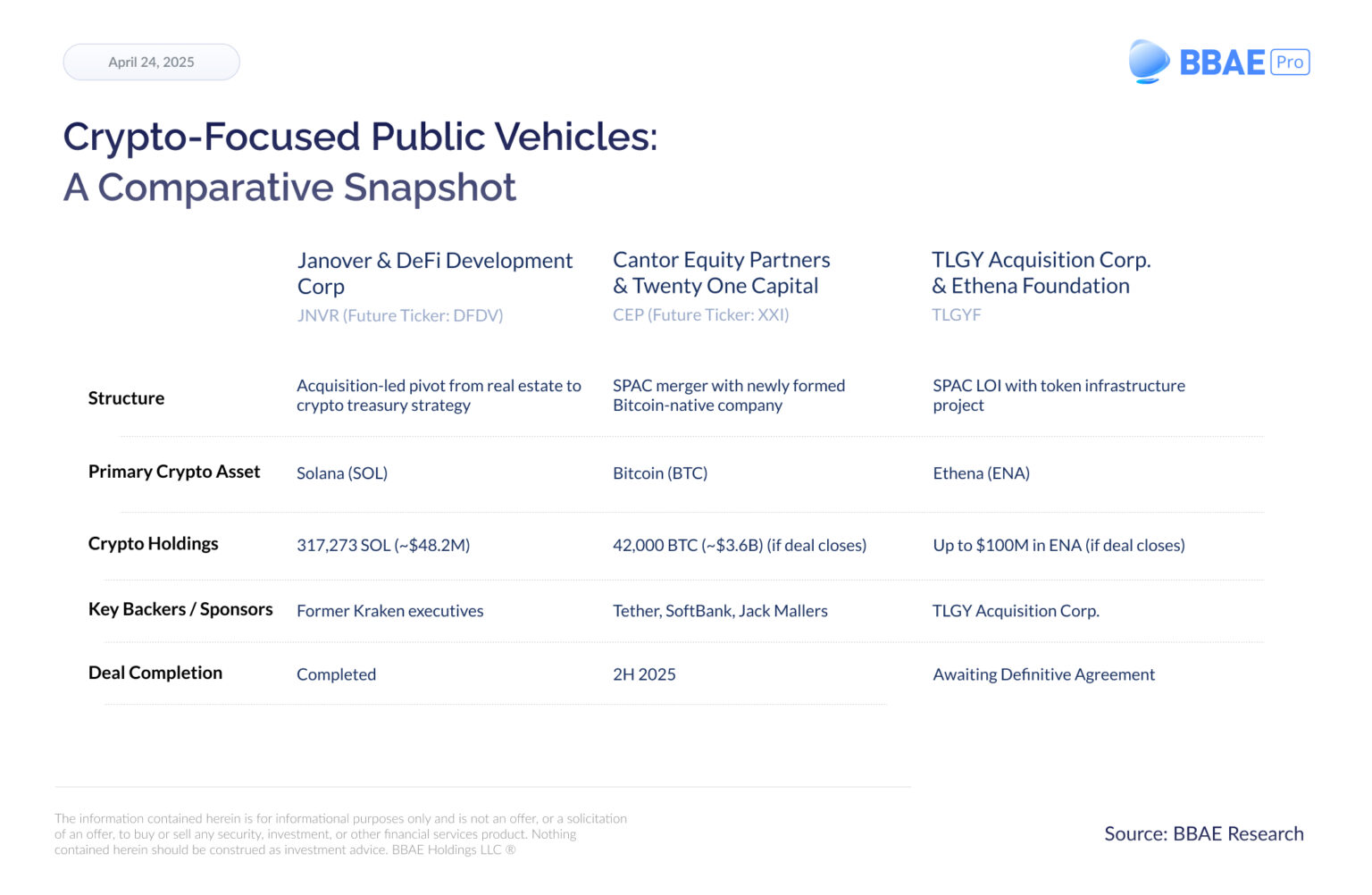The Rise of MicroStrategy-Inspired Public Vehicles
In late 2020, MicroStrategy ($MSTR), a relatively small software firm, changed the narrative around public companies and Bitcoin. Under CEO Michael Saylor, it began aggressively buying Bitcoin with its corporate treasury, eventually holding more than $30 billion worth of BTC. This move turned MicroStrategy into a de facto Bitcoin ETF—without being one—allowing investors to gain crypto exposure through a publicly listed stock. It was a radical blurring of business and belief: the company still sold software, but its stock price was increasingly tethered to the price of Bitcoin.
Nearly five years later, that same playbook is inspiring a new wave of public market activity, as companies reshape themselves—or are newly formed—with crypto as their core operating principle. These aren’t software firms pivoting into blockchain. These are vehicles structured to be Bitcoin-native from the start, often holding crypto as a central asset or treasury reserve, much like MicroStrategy but without the legacy business to maintain.
From Real Estate to Solana: Janover’s Radical Pivot
In March 2025, fintech platform Janover ($JNVR) underwent a significant leadership and strategic shift. A control group composed of former Kraken executives—including Joseph Onorati and Parker White—acquired a majority stake in the company, purchasing 728,632 shares of common stock and all outstanding preferred shares. Onorati was appointed Chairman and CEO, while White became Chief Investment Officer and COO. Marco Santori, Kraken’s former Chief Legal Officer, joined the board alongside existing members Blake Janover and William Caragol.
The new leadership introduced a treasury policy that prioritizes the allocation of digital assets, with an initial focus on Solana (SOL). The company plans to acquire and stake SOL tokens and operate Solana validators, creating a flywheel where validator rewards are reinvested into acquiring more SOL.
On April 22, 2025, the company officially announced its corporate name change to DeFi Development Corporation, reflecting its evolution into a crypto-native treasury vehicle designed for public market investors. The ticker symbol is also set to change to “DFDV” on the Nasdaq at a future date. However, the company now operates under the DeFi Development Corporation identity and continues to grow its Solana treasury. As of April 23, 2025, the company holds approximately 317,273 SOL, valued at $48.2 million including staking rewards.
With approximately 1.5 million shares outstanding, DeFi Development Corporation now holds about 0.22 SOL per share, translating to $32.88 in Solana value per share—up 40% from its last acquisition. CEO Joseph Onorati emphasized the importance of this strategy: “By gaining access to locked discounted inventory through a trusted partner like BitGo, we’re able to accumulate some of our SOL below market prices while deepening our alignment with the Solana ecosystem.”
The move represents one of the first formal integrations of a crypto treasury strategy within a U.S.-listed public company, explicitly modeled after MicroStrategy but uniquely focused on Solana.
The Twenty One Launch: Bitcoin at the Center
In April 2025, Cantor Fitzgerald-sponsored SPAC Cantor Equity Partners ($CEP) announced a merger with Twenty One Capital, a newly launched company formed by Tether, SoftBank Group, and Strike founder Jack Mallers. Twenty One will debut with a balance sheet containing over 42,000 Bitcoin—worth roughly $3.6 billion—making it the third-largest corporate holder of BTC globally. But the ambition goes far beyond treasury holdings: the company plans to be a Bitcoin-native conglomerate that develops advocacy initiatives, content platforms, and potentially Bitcoin-powered financial services. Mallers described the company as a vehicle “built by Bitcoiners, for Bitcoiners,” emphasizing its mission to push the adoption of Bitcoin as a parallel financial infrastructure. With Tether holding a majority stake and SoftBank a significant minority, the deal represents one of the largest crypto-native entries into the public markets to date.
SPACs with Token Playbooks: TLGY and Ethena
TLGY Acquisition Corp. ($TLGYF), a SPAC listed on the OTC, signed a non-binding letter of intent in April with the Ethena Foundation, an organization focused on decentralized validation infrastructure and token economics. Under the proposed terms, TLGY would acquire a validator business and use up to $100 million—sourced from trust capital and a planned PIPE investment—to purchase ENA tokens at a negotiated discount. The ENA tokens are expected to play a key role in Ethena’s upcoming Converge Network, which promises scalable, modular blockchain validation. If completed, the deal would set a precedent for SPACs functioning not just as merger vehicles, but as capital allocators for token-based treasuries. It marks a significant step toward integrating token economics into public equity models.`

Why Now?
Several factors are converging to make this moment ripe for MicroStrategy-style public vehicles:
- Regulatory Tailwinds: The return of the Trump administration has ushered in a friendlier stance toward crypto, promising clearer rules and the end of the SEC’s enforcement-heavy approach. The President himself has been involved in crypto in numerous ways. A day before his inauguration, he launched a meme coin based on the Solana blockchain. Additionally, his company, Trump Media & Technology Group ($DJT), is actively engaging with the crypto space. Recently, DJT partnered with Crypto.com to roll out a series of new ETFs, some of which are focused specifically on crypto assets.
- Investor Appetite: With spot Bitcoin ETFs now available, institutional interest in crypto is resurging. But some investors want vehicles with more leverage or embedded strategy around digital assets.
- Strategic Use of SPACs: Blank-check firms remain a useful tool for building bespoke crypto exposure in public markets, especially when startups want to bypass traditional IPOs.
- Treasury Innovation: Holding crypto as a treasury strategy is no longer niche. With inflation fears and dollar skepticism, Bitcoin and other tokens are seen by some as superior stores of value.
The Bigger Picture
What unites these moves is a shared thesis: that capital markets infrastructure can be rebuilt around digital assets. These companies aren’t trying to add crypto to existing businesses—they’re designing entities that make crypto central to their purpose. They’re products for a new type of investor: one who believes crypto should be embedded in the DNA of public companies.
If MicroStrategy was the prototype, these new entities are evolutions. With more capital, broader ambitions, and fewer constraints from legacy operations, they could reshape how Wall Street allocates to digital assets. These public vehicles offer a new path for accessing crypto exposure in regulated markets, blending the appeal of decentralization with traditional structures.
However, not all investors are fully convinced. Some express concern that these vehicles often trade at significant premiums to the net asset value (NAV) of their crypto holdings. MicroStrategy, for example, has frequently traded well above the value of its Bitcoin reserves—raising questions about whether investors are overpaying for exposure they could obtain more cheaply through ETFs or direct token purchases. Critics argue that while the narrative and branding may be powerful, the underlying value proposition must remain grounded in fundamentals.
Whether this trend creates enduring value or marks another speculative cycle remains to be seen. But for now, one thing is certain: crypto-native public companies are no longer an anomaly—they’re fast becoming a category of their own.
This article is for informational purposes only and is not investment advice or a solicitation to buy or sell securities. The content is based on publicly available information and reflects the author’s opinions as of the publication date, which may change without notice. All investments carry inherent risks, including the potential loss of principal, and past performance is not indicative of future results. Investments in Bitcoin and other cryptocurrencies are highly volatile and speculative, with the potential for significant loss of principal. Market prices for digital assets can fluctuate widely due to changes in investor sentiment, regulatory developments, technological innovations, and other macroeconomic factors. Bitcoin investments are also subject to liquidity risks and regulatory uncertainties that may impact their value and availability. Readers should conduct their own research or consult a qualified financial advisor before making any investment decisions, particularly those involving digital assets. BBAE has no financial interests, business relationships, or affiliations with the companies mentioned in this article, nor have they received any compensation from these companies. BBAE holds no position in the securities mentioned, nor are they compensated by the companies mentioned.














